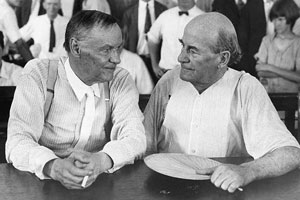Imagine a scenario where someone thinks that the world was created 7000 years ago. God created all life using the same universal code. God also made it so that all the different living organisms look interrelated at the DNA level. In other words it only looks like genes have changed over time in a way consistent with the evolution of fish into amphibians into reptiles, etc.
To be even the least bit reasonable, that someone would need to say that in those 7000 years, changes to DNA have happened that led to antibiotic resistant bacteria, moths of different colors, etc. Maybe changes caused some of us to get lighter skin or become able to drink milk. Maybe even a new species or two evolved.
I want to be clear here that this scenario seems a bit far fetched, Rube Goldberg-ish, and untestable to me. It ignores all of the fossil evidence and lots of other evidence I won't go into. But if someone were to approach biology with this as the backdrop, it certainly seems that he or she could still do biology research.
For example, the biologist could study how a specific gene works in people. He or she could even compare it to how it works in frogs or chickens. Just at the end there would be no discussion about how the gene evolved.
The biologist would point out the differences and investigate the mechanisms of these differences. From this research we could learn under what conditions the gene works and what proteins regulate its activity. We might learn why messing it up causes a disease and learn how to treat the disease. Another scientist could even then look at the research and comment on how it looks through an evolutionary lens.
Is there no benefit to be gained from such research? Is science losing smart, careful scientists who could truly contribute to biology?
I don't know the answers to these questions. My gut tells me that if a person can arbitrarily ignore science that they don't agree with, they can't really be a good scientist. They may decide to ignore other data they don't agree with or that might impact on a different belief system. What do you think?
 Dr. Barry Starr is a Geneticist-in-Residence at The Tech Museum of Innovation in San Jose, CA.
Dr. Barry Starr is a Geneticist-in-Residence at The Tech Museum of Innovation in San Jose, CA.
 Darrow and Bryan at the Scopes Monkey Trial in 1925.A biologist who works on zebrafish was recently fired from Wood's Hole in Massachusetts. His lawsuit claims that he was fired because he told his bosses that he believes in Creationism.
Darrow and Bryan at the Scopes Monkey Trial in 1925.A biologist who works on zebrafish was recently fired from Wood's Hole in Massachusetts. His lawsuit claims that he was fired because he told his bosses that he believes in Creationism.